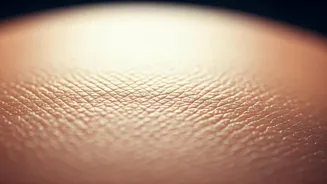Nutrient-Rich Diet
One of the most crucial steps in combating loose skin is focusing on your diet. Ensure you're consuming a variety of foods loaded with essential nutrients
that promote skin health. Prioritize protein intake, as protein is the building block of skin cells. Aim for lean protein sources like chicken, fish, beans, and lentils. Alongside protein, include foods rich in vitamins C and E. Vitamin C is vital for collagen production, which gives skin its elasticity, while vitamin E protects the skin from damage. Sources of vitamin C include citrus fruits, berries, and bell peppers. Vitamin E can be found in nuts, seeds, and avocados. Furthermore, incorporate healthy fats into your diet, such as those from avocados and olive oil, to help maintain skin's moisture and overall health. A diet rich in antioxidants from fruits and vegetables will combat free radicals and support healthy skin regeneration. Lastly, staying hydrated is very important, since it affects the overall texture of your skin. Drinking enough water keeps your skin moisturized and supple from within.
Exercise is Key
Incorporating consistent exercise into your routine is critical to keeping your skin firm. Exercise boosts blood circulation, delivering nutrients to the skin and supporting collagen production. A combination of cardio and strength training is highly effective. Cardio exercises, such as running, swimming, or cycling, help to burn calories and reduce overall body fat. Strength training, like weightlifting or bodyweight exercises, builds muscle mass. As muscles grow, they fill out the space that may otherwise be taken up by loose skin. This can result in a tighter, more toned appearance. Aim to work out at least three to four times a week, gradually increasing the intensity and duration of your sessions. It's also important to vary your workouts to keep your body challenged and prevent plateaus. Consider consulting with a fitness professional to develop a personalized exercise plan that aligns with your weight loss goals and skin health objectives. They can guide you on appropriate exercises and proper form to maximize results and minimize the risk of injury.
Hydration Matters
Staying adequately hydrated is essential not only for overall health, but specifically for skin elasticity. Water supports skin's natural plumpness and resilience. When your body is dehydrated, your skin can appear dry, less elastic, and more prone to sagging. Drinking enough water helps to keep your skin moisturized and improves its ability to bounce back. Aim to drink at least eight glasses of water daily. The amount of water you need can vary depending on your activity level, the climate, and your overall health. If you're exercising, particularly in a warm environment, you'll need to increase your fluid intake to compensate for the water lost through sweat. You can also supplement your water intake with other hydrating beverages such as herbal teas and infused water with fruits and vegetables. Pay attention to your body's signals, and drink when you feel thirsty. Monitoring the color of your urine can also be a simple indicator of hydration. Light yellow urine generally indicates proper hydration, while darker urine may suggest you need more fluids.
Skincare Routine
Establishing a comprehensive skincare routine plays a vital role in maintaining skin firmness. Implement a routine that supports collagen production and overall skin health. Cleansing your skin twice daily with a gentle cleanser is the foundation. This will remove impurities and keep your pores clear. Follow cleansing with a moisturizer that suits your skin type, preferably one with ingredients like hyaluronic acid, which hydrates and plumps the skin. Use products containing retinoids, which are known to increase collagen production and improve skin elasticity. Be sure to apply sunscreen with an SPF of 30 or higher every day, as sun damage accelerates the loss of collagen and elastin, leading to premature aging and skin sagging. Consider incorporating regular exfoliation to remove dead skin cells and promote cell turnover, which keeps skin looking fresh and vibrant. Also, be consistent with your skincare regimen; this will result in noticeable improvements in skin appearance and texture. Consulting with a dermatologist can further enhance your regimen, allowing you to target specific skin concerns and optimize your results.
Consider Supplements
Certain supplements can help support your skin health and its elasticity. Collagen supplements are very popular; they are believed to boost collagen production, which could lead to firmer skin. While there is debate about the efficacy of collagen supplements, many people report positive outcomes. Consult with a doctor or dermatologist before starting any new supplement regime. They can advise you on appropriate dosages and potential interactions with other medications. Other beneficial supplements include vitamin C, which is essential for collagen synthesis, and vitamin E, which offers antioxidant protection. Always focus on a balanced diet first and then consider supplements to address any nutrient gaps. Additionally, ensure you're purchasing supplements from reputable sources, to guarantee quality and purity. Supplements can be a valuable addition to your weight loss strategy, but they should be used to support, not replace, other healthy habits such as a balanced diet, consistent exercise, and adequate hydration. Remember, supplements are not a quick fix, but a component of a holistic approach to skin and overall health.















